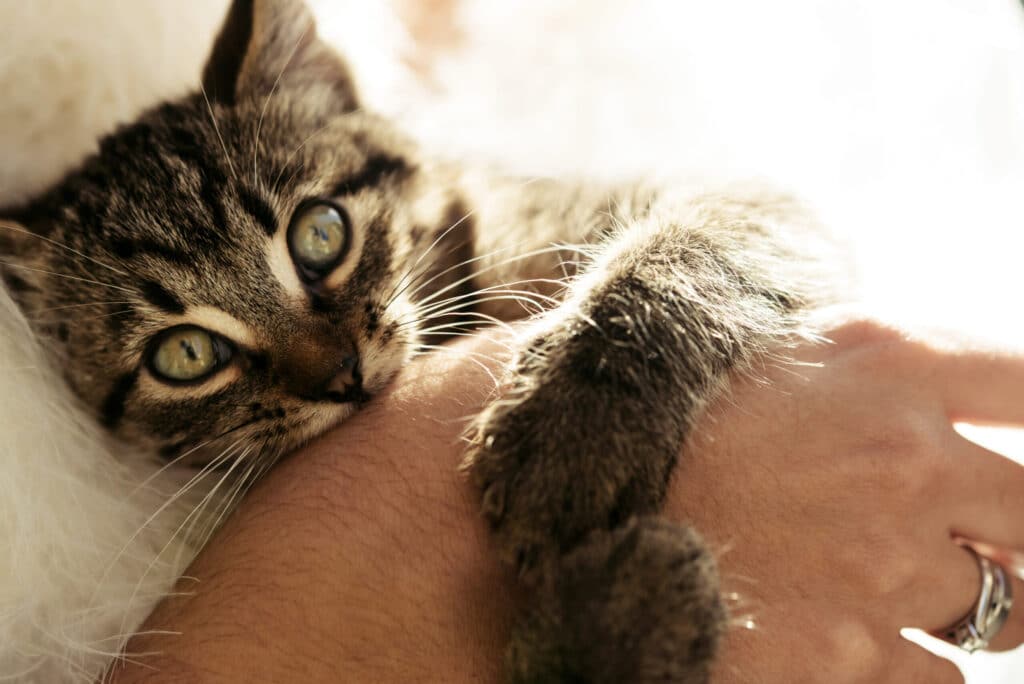How to stop a kitten from biting?
A kitten biting and attacking may seem cute and harmless when they are tiny, but the bites will turn painful as they grow into adulthood. It is therefore essential to look at ways on how to stop a kitten from biting.
Aggression is a significant behavior problem seen in cats, second only to litter box issues. However, we often ignore aggressive behavior in cats because, unlike dogs, cats do not chase people to bite them.
The fact is that we should not take aggression in cats lightly. A bite wound from a cat can become infected because of the dangerous bacteria residing in its mouth.
Cats have teeth and claws, and a bite or scratch from a cat can lead to cat scratch fever, an infectious disease that can trigger flu symptoms.
In short, if you let the kitten continue the behavior of biting and attacking she can grow up into an adult cat that may pose a threat to your family or guests.
If you are concerned about the aggression in your pet and are looking for tips on how to stop a kitten from biting, then read on.
What is aggression in kittens?
Aggression in kittens is any behavior that poses a threat to other pets or humans. An aggressive kitten may make hissing noises and avoid the person or animal triggering the aggression, or it may launch a full-scale attack. Hence, you should watch your kitten’s body language to identify any signs of aggression.
Why do kittens bite?
There are several reasons why a kitten can bite:
- Predatory or play aggression ranging from little to significant scratching and biting; it may be tough to differentiate between the two behaviors.
- Medical issues can also trigger aggression.
- Aggressive behavior can also result from a kitten defending its territory from a rival, another animal, or a child.
It is natural for kittens to pounce, stalk, chase, bite, and scratch due to their predatory instincts. Starting from 4 weeks of age, kittens will begin to track moving objects with their eyes and launch an attack. The targets can include the hand or feet of a human or even a little child; the kitten may use its teeth and claws to launch the attack.
Biting is a natural behavior in kittens, but you need to direct it to the right target and not human hands and feet. Luckily, you can teach kittens the correct behavior with a bit of effort and patience.
When kittens are with their littermates, they indulge in biting as part of play and also learn the limits of what is acceptable. Too hard of a bite can draw rebuke from the mother cat or a bite of similar intensity from a littermate.
Such interaction and play among littermates are essential for a kitten to learn the rules of acceptable behavior. However, a kitten that is separated from its littermate early or hand raised will not have the option of learning this important lesson.
What should you do if your kitten bites you during play?

Do not laugh it off
If your kitten bites, don’t brush it aside; instead, stop playing immediately to help her understand that biting skin means the end of fun. You can resume play once your kitten has had some time to calm down.
Direct attention to a toy
You can direct his attention to a suitable toy such as a feather whip cat wand, pole type toy, a dangling toy, or a catfishing rod. Toys that put a decent distance between your hand and the kitten’s mouth are good options. Holding a small toy in your fingers can lure your kitten into biting your fingers.
You can also use stuffed toys that are the same size as your kitten. Kittens that like to wrestle will appreciate stuffed animal toys. If the kitten becomes aggressive during playtime, you can use the stuffed toy as a distraction.
You can also toss one of her favorite toys away from you during playtime. Throwing the toy will serve two purposes–you are keeping her away from your hands and feet, and you are fostering her instinct to chase and pounce.
You may also like these articles:
- Bringing a new kitten home: Must-know tips
- How to train a kitten – 9 must-know obedience training tips
- How to stop a kitten from biting?
- How to introduce a kitten to a cat? Tips for a safe start
- How to litter train a kitten without a mother
Stop moving
If your ankle is the target of the bite, stand still immediately. Your kitten is interested in the moving target, and when you stand still, your ankle is no longer attractive.
Do not pull away
If the kitten bites your hand or ankle, don’t move away but gently push towards your kitten; this will confuse your kitten, and she will release the grip.
Your finger is not a toy
The kitten needs to understand early that your hand and fingers are not toys. Biting you should never be allowed, whether it pains or not.
Use positive reinforcement
To satisfy your kitten’s instinct to chase, pounce, stalk, and catch prey, use the catfishing rod toy or a wand to trigger the behavior. Move the toy up and down in front of the kitten instead of towards and away to create interest. Once the kitten gets a hold of the toy, let her have the satisfaction of biting before setting it into motion again. Once you are done playing, give your kitten a treat to help her feel the pleasure of eating the prey after catching it.
Consider getting a second kitten
Kittens tend to do well when they have a friend. They will play and run around together, burning pent-up energy, and just like in a litter, they also learn acceptable biting behavior.
Consult your vet
It is also worth visiting your vet to rule out any medical problems that may be triggering the aggression in your kitten. Toxoplasmosis, hyperthyroidism, etc. can cause your kitten to be aggressive. Hence, we highly recommend that you visit a vet early.
Hang a bell
Putting a bell around your kitten’s neck can serve as a warning to children or other pets in case your kitten is stalking them. The bell sound also gives you time to interrupt the kitten and redirect its attention to something else.
Harness and leash
You can get your kitten a harness and leash to control or interrupt unwanted behavior. Merely placing your foot on the harness can stop your kitten from lunging forward to attack.
Burn pent up energy
Remember to engage your kitten in multiple play sessions throughout the day to burn off excess energy. Use a wand toy as it also helps to reduce aggression in your kitten.
Each play session should be about 10 minutes duration, and try to schedule at least two sessions a day. You can increase the session duration if required.
Spaying or neutering
Spaying or neutering before the age of one can make your kitten calmer; it will also help it respond more peacefully to handling as an adult cat. However, if there are other causes such as fear or a medical issue, spaying or neutering will not control the aggression.
Provide continuous mental stimulation
Make sure that you keep changing your kitten’s toys occasionally so that she does not get bored playing with the same toys. You do not need to buy new toys; make sure to rotate the existing toys to keep her interested.
Give your kitten something enjoyable to explore, such as a cardboard box or puzzle feeders that require her to try a bit harder to get the food stored in it. Climbing perches, scratching posts, or a covered outdoor playing area can also prove to be helpful.
Making stalking areas less attractive
If you know that your kitten has a few favorite places where she launches her attacks, you should try to make those places less attractive. You can use deterrent devices to startle your kitten so that she does not frequent those stalking areas.
Be patient
Like with any other behavior training, patience is vital. You need to be consistent and respond in the same way whenever your kitten misbehaves. Do not send mixed signals through an inconsistent response. Your kitten will end up being confused
How not to respond to kitten biting?
Punishing your kitten for biting can spoil your relationship with her in the long run. Hitting your kitten, spraying water, or shouting can frighten your kitten and cause her to release her grip, but your kitten may end up fearing you. There is also the risk that the punishment may cause your kitten to bite even harder the next time or become more aggressive.
Conclusion
A kitten learns, plays, and explores the limits of its boundaries by scratching and biting. It’s a natural behavior, so avoid getting frustrated and do not encourage the kitten biting you in any way. You can go ahead and implement the above tips to get immediate results. Remember to be consistent and try to start as early as possible because if the behavior is allowed to continue unchecked for long, it will be harder to train your kitten out of it.
Once your kitten realizes that her biting is not getting her the expected responses and satisfaction, she will change her behavior eventually. Also make sure to keep her mentally stimulated by providing appropriate toys and plenty of playtime.






